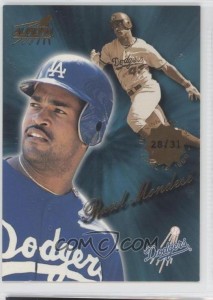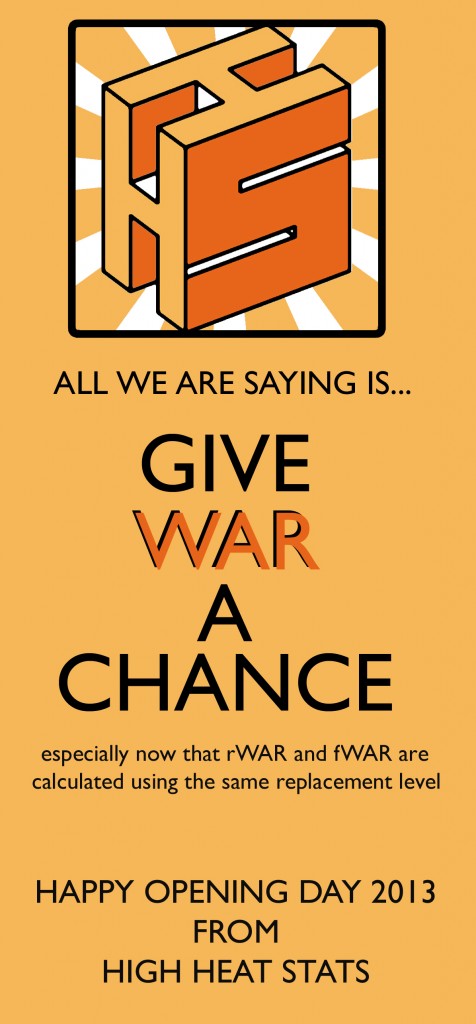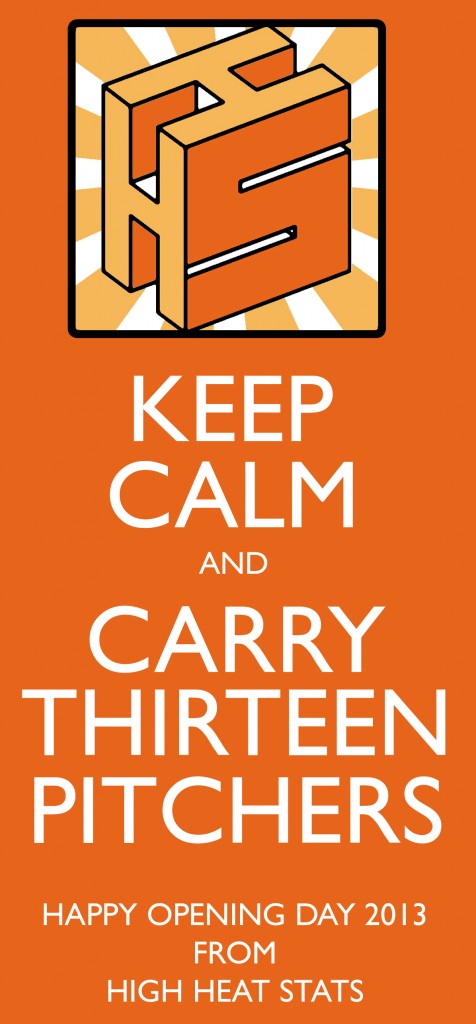There’s Justin Maxwell, standing on third base after tripling, as he did twice last night. Here are the only other guys since 1916 to hit two triples on Opening Day:
| Rk | Player | Date | Tm | Opp | Rslt | PA | AB | R | H | 2B | 3B | HR | RBI |
|---|---|---|---|---|---|---|---|---|---|---|---|---|---|
| 1 | Tony Pena | 2007-04-02 | KCR | BOS | W 7-1 | 4 | 3 | 2 | 2 | 0 | 2 | 0 | 1 |
| 2 | Tommy Henrich | 1950-04-18 | NYY | BOS | W 15-10 | 6 | 6 | 2 | 2 | 0 | 2 | 0 | 1 |
| 3 | Arky Vaughan | 1941-04-15 | PIT | CHC | L 4-7 | 5 | 5 | 1 | 2 | 0 | 2 | 0 | 1 |
| 4 | Bubbles Hargrave | 1924-04-15 | CIN | PIT | W 6-5 | 4 | 4 | 2 | 4 | 0 | 2 | 0 | 0 |
| 5 | Tillie Walker | 1917-04-11 | BOS | NYY | W 10-3 | 5 | 5 | 0 | 3 | 1 | 2 | 0 | 4 |
Tillie Walker didn’t score after either triple, but he did drive in 4.
Rick Ankiel hit a pinch 3-run homer. Although this is also a pretty rare Opening Day feat, George Kottaras did it last year for the Brewers.
Since 1916, he’s only the 11th player to hit a 3-run pinch-HR (or grand slam) on Opening Day:
| Rk | Player | Date | Tm | Opp | Rslt | PA | AB | R | H | 2B | 3B | HR | RBI | BB | SO | WPA | BOP |
|---|---|---|---|---|---|---|---|---|---|---|---|---|---|---|---|---|---|
| 1 | George Kottaras | 2012-04-06 | MIL | STL | L 5-11 | 1 | 1 | 1 | 1 | 0 | 0 | 1 | 3 | 0 | 0 | 0.000 | 9 |
| 2 | Mendy Lopez | 2004-04-05 | KCR | CHW | W 9-7 | 1 | 1 | 1 | 1 | 0 | 0 | 1 | 3 | 0 | 0 | 0.443 | 9 |
| 3 | Mark Sweeney | 1999-04-05 | CIN | SFG | L 8-11 | 1 | 1 | 1 | 1 | 0 | 0 | 1 | 3 | 0 | 0 | 0.204 | 9 |
| 4 | Geno Petralli | 1992-04-06 | TEX | SEA | W 12-10 | 1 | 1 | 1 | 1 | 0 | 0 | 1 | 3 | 0 | 0 | 0.589 | 1 |
| 5 | Terry Whitfield | 1984-04-03 | LAD | STL | L 7-11 | 4 | 2 | 1 | 1 | 0 | 0 | 1 | 3 | 2 | 0 | 0.120 | 6 |
| 6 | Bobby Murcer | 1981-04-09 | NYY | TEX | W 10-3 | 1 | 1 | 1 | 1 | 0 | 0 | 1 | 4 | 0 | 0 | 0.029 | 8 |
| 7 | Norm Miller | 1970-04-07 | HOU | SFG | W 8-5 | 2 | 1 | 1 | 1 | 0 | 0 | 1 | 3 | 1 | 0 | 0.451 | 9 |
| 8 | Duffy Dyer | 1969-04-08 | NYM | MON | L 10-11 | 1 | 1 | 1 | 1 | 0 | 0 | 1 | 3 | 0 | 0 | 0.030 | 8 |
| 9 | Charlie Maxwell | 1959-04-10 | DET | CHW | L 7-9 | 1 | 1 | 1 | 1 | 0 | 0 | 1 | 3 | 0 | 0 | 0.442 | 8 |
| 10 | Frank Welch | 1925-04-14 | PHA | BOS | W 9-8 | 1 | 1 | 1 | 1 | 0 | 0 | 1 | 3 | 0 | 0 | 0.000 | 2 |
These were all 3-run shots, save Bobby Murcer’s pinch homer, which was of the bases-full variety. Note there may be other players who entered as a pinch-hitter and amassed 3 RBI over more than 1 plate appearance, but these are the only guys to get at least 3 RBI on the homer.
Erik Bedard got a save the easy way, pitching 3+ innings in a game that was pretty much out of reach. He’s the first guy to get an Opening Day save while pitching at least 3 innings in a long time:
| Rk | Player | Date | Tm | Opp | Rslt | App,Dec | IP | H | R | ER | BB | SO | HR |
|---|---|---|---|---|---|---|---|---|---|---|---|---|---|
| 1 | Terry Adams | 2000-04-03 | LAD | MON | W 10-4 | 7-9f ,S | 3.0 | 2 | 1 | 1 | 1 | 1 | 1 |
| 2 | Kevin Jarvis | 1997-04-01 | CIN | COL | W 11-4 | 7-9f ,S | 3.0 | 2 | 0 | 0 | 2 | 5 | 0 |
| 3 | Mike Perez | 1995-04-26 | CHC | CIN | W 7-1 | 7-9f ,S | 3.0 | 2 | 1 | 1 | 0 | 1 | 1 |
| 4 | Terry Leach | 1993-04-06 | CHW | MIN | W 10-5 | 7-9f ,S | 3.0 | 2 | 1 | 1 | 0 | 0 | 0 |
| 5 | Wilson Alvarez | 1992-04-07 | CHW | CAL | W 10-4 | 7-9f ,S | 3.0 | 0 | 0 | 0 | 0 | 2 | 0 |
| 6 | Jeff Robinson | 1988-04-05 | PIT | PHI | W 5-3 | 6-9f ,S | 3.2 | 2 | 1 | 1 | 0 | 4 | 1 |
| 7 | Bill Dawley | 1987-04-07 | STL | CHC | W 9-3 | 6-9f ,S | 4.0 | 1 | 0 | 0 | 0 | 3 | 0 |
| 8 | Mark Davis | 1986-04-08 | SFG | HOU | W 8-3 | 7-9f ,S | 3.0 | 0 | 0 | 0 | 0 | 1 | 0 |
| 9 | Ron Robinson | 1986-04-07 | CIN | PHI | W 7-4 | 6-9f ,S | 3.1 | 1 | 0 | 0 | 0 | 2 | 0 |
| 10 | Bruce Sutter | 1984-04-03 | STL | LAD | W 11-7 | 7-9f ,S | 3.0 | 0 | 0 | 0 | 2 | 0 | 0 |
Before Sutter in 1984, as you would guess, it was done quite often.
The Astros played their first game as an AL team 15 years to the day after the Brewers played their first game as an NL team. In that game, Bob Wickman took the loss in the 9th as Kerry Ligtenberg won despite walking 4 while recording only 4 outs. I would love it if somebody could find a link between these two games–maybe a guy who coached in one but played in the other?





